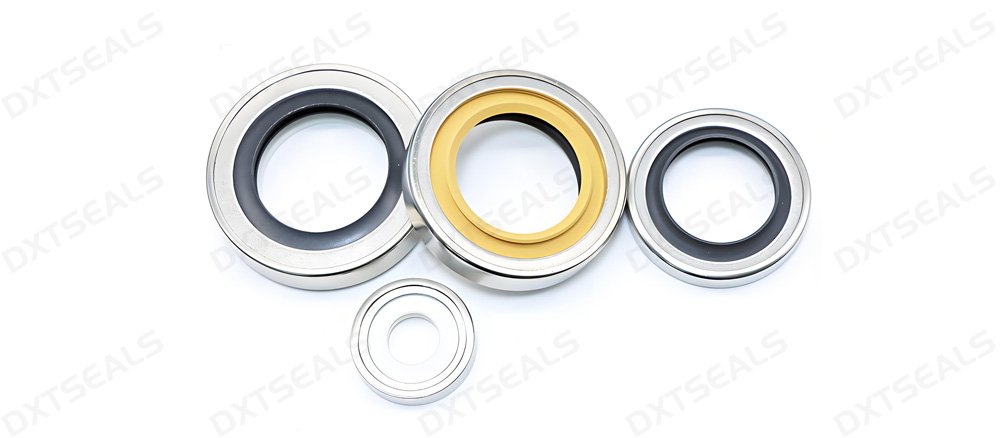
Oil seals are essential components used in a wide range of machinery and equipment to prevent oil or lubricant leakage. They are designed to create a secure seal between rotating and stationary parts, helping to maintain the integrity of the system and prevent contaminants from entering. With so many types of oil seals available, choosing the right one for your application can be challenging. This comprehensive guide explores the different types of oil seals and their features, helping you make an informed decision for your sealing needs.
1. What is an Oil Seal?
An oil seal, also known as a mechanical seal or shaft seal, is designed to prevent the leakage of lubricants or fluids from the parts of machinery. It functions by maintaining a tight seal around a rotating shaft while keeping out dirt, dust, and moisture. Oil seals are used in various industries, including automotive, aerospace, manufacturing, and more.
2. Common Types of Oil Seals
Oil seals come in different materials, designs, and configurations to meet specific requirements. Here are the most common types of oil seals:
a) Rubber Oil Seals
Rubber oil seals are widely used in various industries due to their versatility, cost-effectiveness, and excellent sealing properties. Rubber seals can withstand high pressure and provide resistance to a variety of oils, chemicals, and temperatures.
Features:
- Material: Typically made from elastomers such as Nitrile (NBR), EPDM, or Viton.
- Temperature Range: Depending on the material, rubber oil seals can operate in a wide range of temperatures.
- Flexibility: Rubber seals offer excellent flexibility, ensuring a tight seal in various applications.
Best Applications:
- Automotive engine seals
- Hydraulic systems
- Pumps and compressors
b) PTFE Oil Seals
PTFE (Polytetrafluoroethylene) oil seals are known for their high chemical resistance and ability to perform in extreme temperatures. PTFE seals are often used in industries where exposure to harsh chemicals, solvents, or high temperatures is common.
Features:
- Material: PTFE is chemically inert and highly resistant to heat and corrosion.
- Temperature Resistance: Can withstand temperatures up to 260°C.
- Durability: Offers long-lasting performance with minimal wear.
Best Applications:
- Chemical processing
- High-temperature applications
- Pharmaceutical and food industries
c) Metal-Cased Oil Seals
Metal-cased oil seals feature a metal outer casing that provides additional strength and stability. The metal casing also helps the seal withstand high-pressure conditions, making them ideal for demanding applications.
Features:
- Material: Combination of metal and elastomer.
- Pressure Resistance: Metal casing offers superior pressure resistance compared to rubber seals alone.
- Durability: Suitable for high-speed and heavy-duty applications.
Best Applications:
- Heavy machinery
- Automotive and industrial equipment
- Gearboxes and differential seals
d) Spring-Loaded Oil Seals
Spring-loaded oil seals are designed with an internal spring to maintain the sealing pressure against the shaft. This design helps ensure a consistent and reliable seal, even in fluctuating pressure or temperature conditions.
Features:
- Material: Elastomers combined with metal springs.
- Enhanced Seal Performance: The spring ensures the sealing lip maintains contact with the shaft for an optimal seal.
- Pressure Tolerance: Works well in dynamic applications where pressure and shaft movements change frequently.
Best Applications:
- Automotive applications
- Heavy-duty machinery
- Pumps and engines
3. Factors to Consider When Choosing Oil Seals
Selecting the right oil seal for your application requires consideration of several factors. Here are the key factors to keep in mind:
- Operating Temperature: Different seals have different temperature tolerances. Ensure the seal can operate within the required temperature range.
- Pressure Conditions: If your application involves high pressure, a metal-cased or spring-loaded oil seal may be necessary.
- Chemical Exposure: For environments exposed to harsh chemicals or solvents, PTFE or Viton seals are ideal due to their chemical resistance.
- Shaft Speed and Motion: The dynamic motion and speed of the shaft can influence seal performance. High-speed or high-vibration applications may require a spring-loaded or metal-cased seal for better durability.
- Application Environment: Consider environmental factors such as dust, dirt, moisture, and exposure to UV rays when choosing an oil seal.
4. Why Choose DXTSEALS for Your Oil Seal Solutions?
At DXTSEALS, we specialize in providing high-quality oil seals tailored to meet the unique needs of your applications. Whether you need rubber, PTFE, or metal-cased oil seals, we offer a wide range of products that provide superior sealing performance. Our oil seals are designed for durability, resistance to wear, and efficient sealing in various environments.
We also offer custom oil seals and sealing solutions that can be engineered to your exact specifications. With our expert team, you can trust that you’ll receive the best sealing products for your equipment and machinery.
